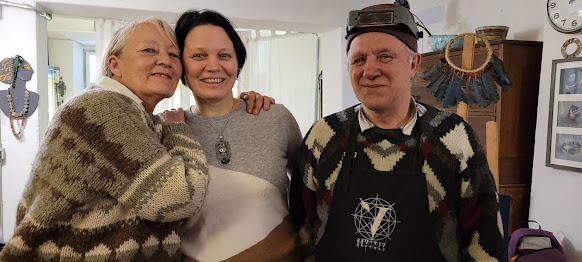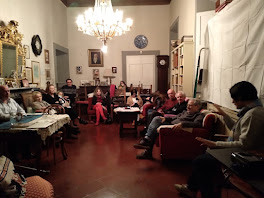From "Kelebek," Miguel Martinez's blog
12/12/2021
by Miguel Martinez
Last night at sunset, a big chill, dark red clouds to the west. And the half moon, above the black cypress trees to the right, silhouetted against the fire of the dying sun.
Below Bellosguardo, that silent little wall where sometimes a black cat walks, and to the left you can see the snow on the mountains, and, below, the city of the old enemy, Fiesole....
We go up towards Marignolle, and Marco recites to me the verses of the mad poet, Dino Campana:
To the ghostly garden of mute laurels
To the green garlands
To the autumnal earth
A final greeting!
Walking between the silent walls that hide the secrets of an occult city, we arrive at the villa of the ancient family.
From one end of the great hall, Abraham looks at us in an eighteenth-century painting, as he prepares to sacrifice Isaac; from the other end, the ancestor of the family looks at us in a portrait, and has the same beard and the same look (and faith) as Abraham. And between the two, the menorah, on the wooden sideboard that bears the date MDCXXXVII engraved on it.
We gathered to hear Anastasija Makarieva, black hair, almond-shaped blue eyes and high cheekbones, from the Institute of Nuclear Physics in St. Petersburg. An institution heir to that other half of the world, which not only managed to build Soviet atomic bombs from scratch, but explored worlds unknown to Westerners.
Anastasija (with the accent on the "i") doesn't deal with atomic bombs at all, but with forests.
We've all heard of the forests of the Amazon, but we never talk about the perhaps even larger ones that stretch from the Baltic to the Pacific.
Now, as an oriental language major who has a hard time telling an ash tree from an elm, who hasn't taken notes, and is going from memory, I'm going to try to report to you what Anastasiya said, any nonsense is just my own.
It is said that we are living an immense environmental crisis, linked to CO2 emissions with related global warming; and that we must therefore reduce these emissions.
Which however has a huge consequence: if the problem is too much CO2, we reduce CO2 even at the cost of an extermination, end of the problem. The war against climate change is all there.
The scientists in St. Petersburg do not deny the issue of emissions at all, but they say that there is another factor, which is perhaps even more important, that is leading us towards climate catastrophe.
If life exists, it exists because the biosphere exists; and the biosphere is intimately linked to something the Russians call the biotic pump.
Trees are apparently remarkably incompetent machines: they disperse 90% (I'm quoting from memory) of the water they absorb into the atmosphere.
But coastal trees catch what little water the sea sends down to the earth; they alone, through evapotranspiration, are able to make what by its nature goes down go up. Emitting not only water, but also other substances that allow the water to condense, they form clouds, and through various very complex mechanisms - which complement those known to meteorology - they create winds, which bring moisture inland.
And they therefore allow life on the continents, and generate rivers. So, life on earth depends on the forest world. But it's not enough to plant millions of trees at random, as the technogreens would like to do.
Anastasija tells us about the fir trees, planted en masse at the beginning of the twentieth century, in Bohemia, which today have been infested and destroyed in a short time by pests, because there is no variety; about the problem of coeval trees - the biotic pump really works only when there is the set of trees of many generations, with the whole surrounding ecosystem.
And an American artist listening to us tells of a friend of his, who in order to recreate a forest, very slowly took the humus of a still intact forest, with all its variety.
Siberia and Amazonia are the two forest poles of the world, in their immense diversity. But for some reason, the Siberia they're selling off to the multinational timber industry doesn't seem to interest anyone.
"I've only been to Siberia twice," Anastasija admits. "But every year my partner and I camp in a tent on the coast of the White Sea."
Once we saw a bear. From very far away... so we got closer.
We found him in front of us, and then I felt inside me, what the bear was thinking inside his head: the end had come!
He looked one last time at the sea, then turned around, trying to show as little as he could of his profile. And then suddenly, he gathered all his strength, and ran off into the woods!"
And she gives us the picture of the owl, seen in a tree far, far north, with which we open this story.


